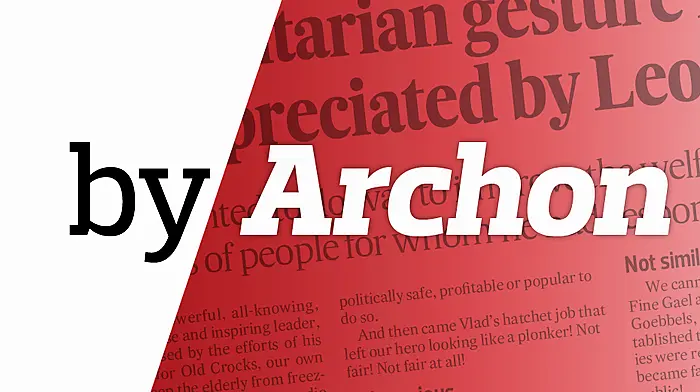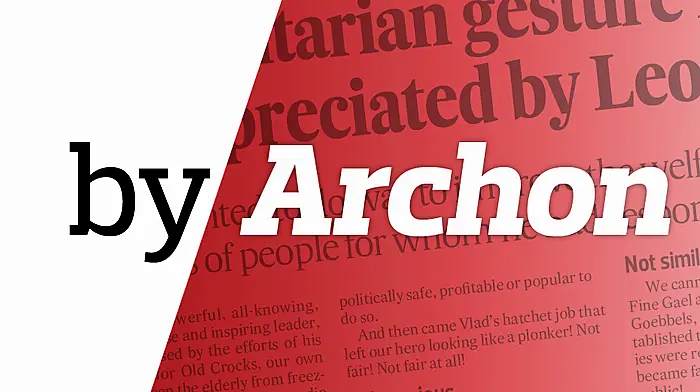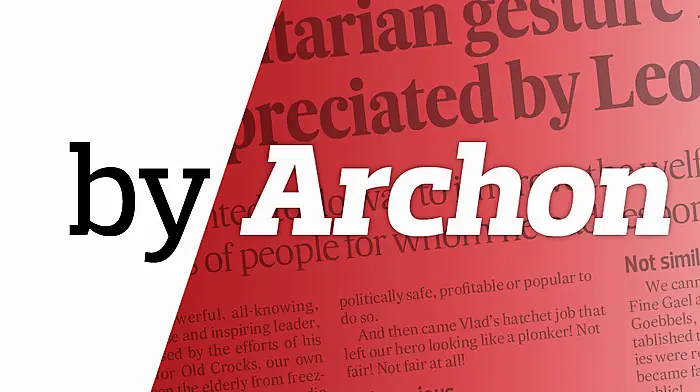Senator advises party colleagues to keep it simple when out canvassing and not to use big words when talking to ‘rural voters’
LEAVING aside the possibility that Greenies are bonkers but come across as well-intentioned suppliers of comical relief in the tedious world of Irish politics, it is important to acknowledge the contribution they make to the correct usage of modern English. Oh yes!
For instance a Greenie senator, Róisín Garvey, has advised the faithful to keep it simple when canvassing and not to use big words when talking to ‘rural voters.’ According to a report in the Indo, punters might not understand the complexity of a Green vocabulary that relates to matters of great environmental importance.
For example, words like ‘sustainable,’ ‘impacted’ or ‘biodiversity’ are products of a modern, streamlined form of spoken English. The Senator refers to it as ‘new stuff’ and, although used with the best intentions by the Greenies, such terminology could come across to country folk as little more than mumbo-jumbo. It’s a lesson that Ms Garvey said she learned from working with the Travellers!
Flowers and catle
The Clare-based senator said of rural voters: ‘We don’t have to give them statistics on carbon this and climate that, and use big vocabulary … Let’s talk about the flowers and cattle. Talk about the robin, the sparrow … It’s not your job to show off that you know cool terms when you’re canvassing.’
What excellent advice! Sparrows and robins in lieu of the highly complex Common Agricultural Policy, the Beef Data & Genomics Programme and the Farm Improvement Plan!
In other words, Clare people should not be exposed to complex language, jargon, and obscure metaphors because the poor sods, literally, would be lost for words – and, of course, the Greenies lost for votes!
Apparently the crunch point when seeking votes is to be able to demonstrate that the Greens can relate to everybody, even the sparrows. And, it seems it’s a skill that can be enhanced ‘if one wears the Clare jersey, goes to hurling matches and gets to know one’s parish priest!’
Most importantly, plain, unadorned language that one might use when communicating with Travellers should be the order of the day. Brill!
So, out the door (we presume) goes classic terminology, such as ‘anti-disestablishmentarianism,’ as well as simpler words like ‘collaboration,’ ‘exponential,’ ‘strategic direction’ and ‘funding stream.’
Linguistic jewels
But there’s a downside. Question is, what will happen to Greenie ‘comprehensibility’ if Eamo, Ms Martin and Hazel Chu avoid expressions, such as ‘human capital,’ ‘the new normal,’ ‘mainstream media,’ ‘going forward,’ ‘we remain cautious,’ ‘solutions’ and, of course, the time-honoured but linguistically-obnoxious ‘reaching out’?
Is it possible that the day will come when the Green Party abandons its etymological forays into proper English and eschews those lovely ‘big words’ for a type of language that even the country bumpkins in Senator Róisín Garvey’s bailiwick will understand?
That, we suggest, will happen should she couch her words in the arcane style of ‘Me Tarzan, you Jane’? Which raises the following scenario: Will Greenie canvassing among Travellers and the politically-unsophisticated be punctuated with wild gesticulations and inane comment, such as ‘Hello. Me Senator. Me Green Party. Me big brain. You small brain. You vote me! OK?’
We wait with bated breath!
Another fine mess!
A matter that former ‘múinteoir’ and temporary Taoiseach, Our Mickey, ‘might pick up on’ (as they say in the linguistically-convoluted Cork city) is the popularisation of a traditional after-dinner dessert called Eton Mess. It consists of strawberries, meringue and cream and is traditionally served at Eton College’s annual cricket game against the pupils of Harrow School.
A variation of the dish could become a favourite in this country if it were served with watery rhubarb and very cold, lumpy custard, and called ‘The Leaving Cert Mess’ or ‘Mickey’s Mess.’. And no second helpings!
Bring in the army
Aontú leader and former Sinn Féin ideologue, Peader Tóibín, denounced the call made by a
Fianna Fáil senator that the Army (of the 26-County State) should be used to clear students from the streets of Galway when they gather for the purpose of drowning in alcohol the impact of the Leaving Cert chaos. The procedure is to swill beer, dance and sing and then continue to disease-ridden (Covid-19) house parties.
In co-operation with the Gardaí, the University announced it had a plan to suspend students caught cavorting in public places and infecting vast expanses of Connemara.
Tóibín, quite correctly, blamed Mickey’s government for the exam shambles and for lumping unnecessary stress on the adolescent shoulders of students who now find themselves deprived of their preferred choice in third-level education.
Fairness and common sense were needed now more than ever, Tóibín said, and that information should be provided immediately on where the extra courses and places will be offered.
He also demanded that the company at the heart of the ‘points’ debacle be held to account.
Military matters
Oh, and here’s a good one that Sinn Féin dragged out of Minister Simon Coveney’s military closet: They wanted to know if Irish Army Ranger Wing soldiers, stationed in Mali as part of an EU military force, had any role in the training of military forces responsible for a recent coup d’etat. If so, a breach of Irish neutrality may have taken place. Interesting!
Courthouse comedy
And, since we’re talking of neutrality and legal matters, recent wanderings around the Courthouse in Cork city brought us into the company of some wags with whom we discussed the knotty problem as to whether lawyers had feelings (allegedly).
Which led to appalling jokes about the administration of justice in Cork city – such as the case of the woman who almost beat her husband to death with his guitar collection. The judge asked: ‘First offender?’
To which the woman replied: ‘No your honour. First a Gibson, then a Fender!’
Or the judge who proclaimed: ‘I hereby send you to prison for 10 years.’ The barrister asked if the sentence could be shortened, to which the judge nodded in agreement, and said: ‘I send you to prison for 10 years.’
Or the cross-examination blunders: ‘Now, your youngest son, the 20-year-old, how old is he?’ And this one: ‘Were you alone, or by yourself?’ or ‘Were you present when the picture was taken?’
But thwe best witticism of the day was about the judge who slammed down his gavel, yelled ‘Guilty!’ and stormed out just as the barrister was about to present his client’s case. ‘Clearly the judge is struggling with premature adjudication!’ remarked the barrister.










